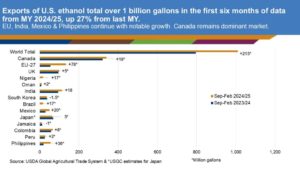 U.S. ethanol exports have already topped one billion gallons just halfway through marketing year 2024/2025, up 27 percent increase from the previous year, according to the latest information from USDA.
U.S. ethanol exports have already topped one billion gallons just halfway through marketing year 2024/2025, up 27 percent increase from the previous year, according to the latest information from USDA.
U.S. Grains Council (USGC) director of global ethanol export development Alicia Koch says the sharp rise in ethanol sales contributed to an 11 percent increase in U.S. grains in all forms (GIAF) exports compared to last year’s data. “It’s a sign that the U.S. ethanol industry is ready and willing to handle increased global demand and the Council is effectively implementing its international marketing strategies to generate interest in biofuels across consumers and policymakers around the world,” said Koch.
Canada is maintaining its place as the top importer of U.S. ethanol, purchasing 19 million more gallons than at this point in the last marketing year, and the European Union is showing strong appetite for U.S. ethanol by importing 78 million additional gallons.
Other notable improvements include the development of exports to Brazil and Nigeria, nations that previously imported little to no U.S. ethanol. Ethanol exports to Mexico are up 68 percent, launching it into seventh place among U.S. ethanol’s largest trading partners.
“Building new demand is a pillar of the Council’s commitment to U.S. producers because of the financial benefits derived from diversified markets for U.S. ethanol, and we certainly see the potential for further breakthroughs in countries like Brazil, Nigeria, the Philippines and others,” Koch said.










